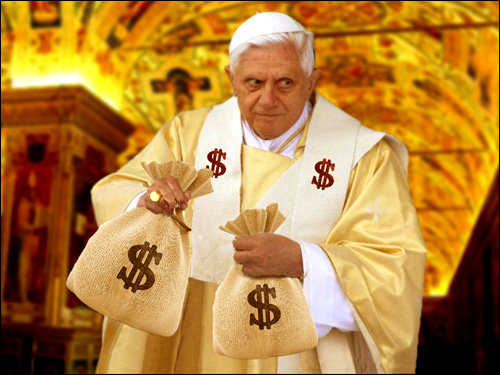Mon 22 Oct 2012
Religion’s Big Whimper
Posted by anaglyph under Hmmm..., In The News, Religion, Science, Skeptical Thinking, Space
[58] Comments

CERN, in Geneva, has been holding over the last few days a conference called ‘The Big Bang and the interfaces of knowledge: towards a common language?’
Decoding this for you: it’s a convening of scientists and various religious commentators to attempt to find a way to square religion with the uncomfortable facts that science throws up to challenge it.
After pausing for just a moment to reflect on whether Betteridge’s Law should be applied to the conference title, let’s hear what the first speaker at the conference, Andrew Pinsent had on his mind according to BBC News Europe. Science, he said, risked:
“…trying to turn society into a machine” if it did not engage with religion and philosophy.
Of course, he does not really mean ‘philosophy’ here, because science has always engaged with philosophy, from the very earliest of Greek knowledge at least, and probably before that. No, he has lumped philosophy in there in order to stack it squarely on the side of religion and divorce it from science because he needs to do that to set up his argument. As is almost de rigeur for religious thinkers ((I use the word advisedly, because I actually don’t believe many of these people really think.)) these days, he starts by depicting science as a mechanical process devoid of any wonder or beauty, so that he can make those things the sole domain of religion; science will make us into machines, religion is the only chance we have to stay human. ((Whatever ‘human’ actually means. We are now completely augmented by the science we have created. We are already ‘machines’. Maybe Mr Pinsent thinks we should go back to the pre-fire veldt. Oh wait, we were using tools even then.))
Why do religious people think like this? It’s profoundly offensive for a person such as myself who has no religious belief to hear that I can’t, apparently, experience the world as anything other than cold mechanical processes. Does Mr Pinsent have no clue at all that by voicing this opinion he is saying ‘Those of us who hold religious beliefs are better than the rest of you’?
You can see that I am predisposed already to think that this CERN conference is likely to be a pile of horseshit. Mr Pinsent goes on:
‘Science in isolation is great for producing stuff, but not so good for producing ideas’
What a brainless pronouncement. This man is confusing science with industrial manufacture. Why is he speaking at a conference at CERN? What does he even mean by ‘science in isolation… [is] not so good for producing ideas’? Isolation from what? Its ideas maybe??? WTF? ((I’ll allow that Mr Pinsent might have been quoted out of context here – it’s hard to tell in the BBC article. It goes on to tell us that Mr Pinsent says we ‘need to get back to the ideas of Einstein’ – as if somehow there are no great thinkers in science anymore. This is the comment of a person with a profound lack of knowledge of science and scientists. It’s a mark of people who want to seem like they’re talking knowledgably about science to refer to Albert Einstein – the only great scientist they know. Mr Pinsent, you might like to read up on some of the great modern ideas people of science: Richard Feynman; Roger Penrose; Geoffrey West; Stephen Hawking; Garret Lisi – oh, and I could go on for pages… But when you’ve finished, then tell me with any earnestness that science is no good for producing ideas.))
Further down in the BBC article we hear from co-organiser of the conference Canon Dr Gary Wilton, the Archbishop of Canterbury’s representative in Brussels, who said that the discovery of the Higgs particle:
… raised lots of questions [about the origins of the Universe] that scientists alone can’t answer.
Yeah, and you know what Canon Dr Wilton? The Anglican Church can’t answer them either. Nor can any other religion on the planet. Making up a story does not count as an answer.
Another of the speakers at the conference, Professor John Lennox from Oxford University, is on record as having taken Stephen Hawking to task for asserting that we do not need to entertain the idea of a ‘God’ setting the Universe in motion:
When Hawking argues, in support of his theory of spontaneous creation, that it was only necessary for ‘the blue touch paper’ to be lit to ‘set the universe going’, the question must be: where did this blue touch paper come from? And who lit it, if not God?
Who lit the blue touch paper if not God? Oh, how about a rainbow-coloured unicorn, or a jolly green elf? They’re at least as plausible as candidates for holding the matches as the Christian God. The fact is, the beginnings of the Universe are shrouded in mystery. Mystery, as in ‘We don’t know – it’s a mystery’ not ‘It’s a mystery and therefore it’s the God (that I personally believe in) that was written about in an ancient book full of irrational beliefs!’ We’ve had other things that were shrouded in mystery in the past and they’re not now. Many of those things (the Earth-centered Universe; the order of life on Earth; lightning; the processes of human birth, of the cardiovascular system, of the brain; the giant fossil bones in river beds) were once mysteries, in just the same way as religion sees the beginning of the Universe now. It is a constrained mind that can’t make the equation here. ((And, aside from that – as I’ve written on these pages before – it is entirely possible that at some stage or another we might run up against the limits of human comprehension. There is nothing that says that we will necessarily be able to understand the Universe. This is no license to presuppose God, however.))
This kind of nutty religious noodling simply makes me furious. These people don’t want a serious philosophical debate, no matter how they may be couching it. Having a genuine philosophical discussion about these kinds of big questions might be of some value. Having a religious discussion is entirely worthless because they’ve already made up their mind that they know the answer.
Canon Dr Wilton sums up his hopes for the CERN conference by saying:
By the end… we might find new ways of understanding our own positions.
By which he means ‘I’m never going to change my mind, because I hold an irrational belief that can’t be swayed no matter what. But maybe I can get scientists to cut me some slack and stop being such a nuisance with their infernal ‘facts’.’
Canon Dr Wilton has no intention whatsoever of ‘finding a new way to understand his position’ – not in any meaningful way, in any case. Faced with a mystery, he just calls ‘God’ and that’s the end of it. That’s not how science works. Science is able to entertain the idea of a mystery without making a pronouncement. Or, science can contemplate the proposition that an old bloke with a white beard set things in motion. Or that it’s turtles all the way down. Or that we’re in someone else’s computer simulation.
The difference is that scientists just don’t merely presuppose one of those things and set about trying to convince everyone by talking it up. Science needs evidence, something religion is remarkably short on.
___________________________________________________________________________
Addendum: As I was writing this over the weekend, the BBC site published an update to the conference. It was refreshing to see, at last, some thoughts from an actual scientist – physicist and all-round sensible person Lawrence Krauss:
One gets the impression from a meeting like this that scientists care about God; they don’t. You can’t disprove the theory of God. The power of science is uncertainty. Everything is uncertain, but science can define that uncertainty. That’s why science makes progress and religion doesn’t.
Contrast that to this further waffle from the Professor John Lennox, who we heard from above:
If the atheists are right, the mind that does science… is the end product of a mindless unguided process.Now, if you knew your computer was the product of a mindless unguided process, you wouldn’t trust it.
I doubt Professor Lennox has even the faintest clue how utterly stupid a declaration like that sounds. It’s just another way of saying ‘But look at how amazing humans are! That can’t just be a product of evolution!’ Well, Professor Lennox, it can be and it is. Your lack of understanding of how things work does not, as I’ve said, imply the existence of a God, no matter how much mystery there is in the process.
Andrew Pinsent also features in the update, once again attempting to create a division between science and philosophy, as if scientists can’t be philosophers. Just look at his language – it is careful and insidious. Lawrence Krauss, by contrast, makes it clear that the issue here is science and religion, not philosophy. If you’ve read any of Krauss’s books, you will know that, like all good scientists, he’s no stranger to philosophy.
___________________________________________________________________________
Thanks to acce245 for throwing this one my way.






